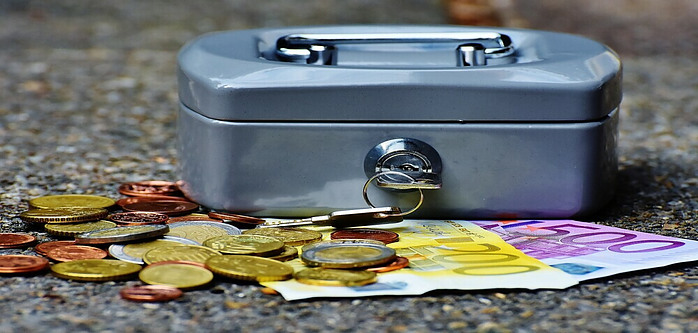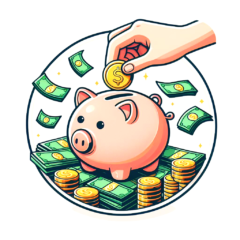
I’m going to start off by explaining exactly what an emergency fund is and why it’s such a cornerstone of financial planning. An emergency fund is like your financial safety net, designed to catch you if unexpected expenses pop up – and trust me, they will. It’s not just a pool of money; it’s peace of mind that you can handle life’s curveballs without going into debt.
You’re also going to find out about the role of emergency funds in maintaining financial security. It’s like wearing a seatbelt in your day-to-day finances. You buckle up each time you get into the car, not because you expect to get into an accident, but so you’re protected if it happens. Similarly, an emergency fund is there to protect you from the financial impact of unforeseen incidents, like sudden medical expenses or a job loss.
We’ve all faced those unexpected bills – the car breaks down, the water heater needs replacing, or medical emergencies. These aren’t rare one-off events; they’re part of life. And that’s why an emergency fund is so vital. It’s not about whether or not these costs will arise, but when. Having an emergency fund means you won’t have to scramble to cover these expenses or resort to high-interest debt options.
Think of it like this: When life throws a wrench into your plans, your emergency fund is there to smooth things over. Here’s a picture for you: One day, your refrigerator stops working. Without an emergency fund, you might be peering into an abyss of spoiled food and stress. With it, you’re just a minor inconvenience away from your next grocery run.
Determining Your Emergency Fund Needs
Have you ever wondered about the right amount to save in your emergency fund? There’s no one-size-fits-all answer, but I’m going to help you figure out what makes sense for you. The size of your emergency fund should be tailored to your unique situation, taking into account various factors.
Firstly, let’s talk about your living expenses. These are the bills that keep your household running each month – think rent or mortgage, utilities, food, and insurance. A common guideline is to save enough to cover three to six months of living expenses. That way, if you hit a rough patch, like job loss or medical emergencies, you won’t be thrown into financial turmoil.
If you’re a freelancer or running your own business, your emergency fund needs may differ from those who have a full-time, stable job. Without the same predictable income, it might be wise to aim for a larger cushion, potentially six months or more of living expenses.
It’s important to remember, your emergency fund isn’t a set-it-and-forget-it deal. You should revisit your emergency fund periodically, especially after life events like a career change, a move to a different city, or a change in family size. These events can significantly impact your financial requirements and dictate the need to adjust your emergency fund accordingly.
Now, let’s pivot to the specifics of how to build up this essential financial reserve. You’re going to find out about practical strategies that can work for a range of budgets and lifestyles.
Building Your Emergency Fund: Practical Strategies
I’m going to show you some proven tactics to grow your emergency fund. Now, don’t worry too much about speed; it’s consistency that’s key here.
High-yield savings accounts are a superb choice for your emergency stash. These accounts offer better interest rates than standard savings accounts, meaning your money grows faster while it sits there.
I’m here to help you strike a balance between beefing up your emergency fund and paying off debt. It’s a common conundrum, but here’s my take: prioritize high-interest debt. However, ensure you’re still contributing something to your fund. If you’re having a hard time coming up with enough money to keep it going, consider taking on a second income that earns while you sleep.
Choose something that resonates with you when it comes to unexpected cash inflows. Got a tax refund or a bonus at work? Great! Before splurging, think about bolstering your emergency reserves.
Your first attempt doesn’t need to be your last. Adjust your savings plan as your financial situation changes, but keep the momentum going.
Maintaining and Utilizing Your Emergency Fund Wisely
So, you’ve got your emergency fund squared away. That’s a big achievement, and it offers you a sturdy financial safety net. Now, the tricky part isn’t over; it’s about managing this fund with both sensibility and insight. Let’s discuss how to ensure the fund remains available when you need it most while preventing misuse that could diminish its value.
First off, you want to make sure the emergency fund is liquid enough to be quickly accessible in a true pinch. Think high-yield savings accounts or money market funds. These options often combine decent returns with easy access. But here’s a heads up: make sure you’re not dipping into these funds for impulsive buys, no matter how tempting that might be.
Why is this important? Well, one of the overlooked aspects of an emergency fund is the psychological comfort it provides. Knowing you have a monetary buffer can significantly reduce stress and improve your overall well-being. It’s not just a fund; it’s emotional insurance too.
But, even with the best of intentions, sometimes lines get blurred. Not every urgent desire is a true emergency. Always ask yourself: Is this expense both unexpected and necessary? If your car breaks down, yes, tap into that fund. But if it’s about upgrading to the latest smartphone—pause and think.
Finally, remember that an emergency fund is not static. If you end up using it, prioritize replenishing it. Life is unpredictable, and the peace of mind that comes with being prepared is invaluable. Adjust your budget, maybe tighten up other spending, but get that safety net back in place. Keep in mind, your first attempt at building and maintaining an emergency fund doesn’t need to be perfect. You can always adjust your approach down the road, but always with an eye towards being prepared for life’s surprises.

This was really helpful!
Even though it seems quite obvious after reading your article, I never thought too much about a financial safety net. I of course, thought about (and engaged in) savings accounts, but I see that forming safety nets specifically for unexpected and urgent financial circumstances is an excellent idea.
Thank you for sharing this, I will definitely be doing this from now on.
All the best.
Glad it resonated with you! And best of luck putting that safety net together!
Mark
This was such a clear breakdown of why an emergency fund matters. I used to think of it as ‘extra savings,’ but the way you compared it to a seatbelt really hit home—it’s about protection, not just money. I learned the hard way when my car needed a big repair last year and I had nothing set aside; I had to put it all on a credit card. Since then, I’ve started building up a small fund in a high-yield savings account, and even though it’s not huge yet, just knowing it’s there gives me peace of mind. Thanks for the reminder that it doesn’t have to be perfect from the start—consistency really is the key.
Absolutely, Jannette. It really is all about consistency.
Mark